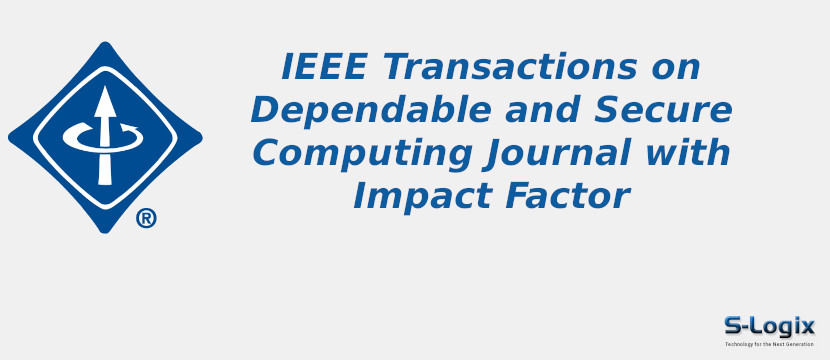IEEE Transactions on Dependable and Secure Computing is a peer-reviewed journal dedicated to publishing high-quality research articles, reviews, and technical notes on the theory, design, implementation, and evaluation of dependable and secure computing systems. The journal covers a wide range of topics that address both the dependability and security aspects of computing.
Objective:
The primary objective of TDSC is to advance the knowledge and understanding of dependable and secure computing by publishing cutting-edge research that addresses critical challenges and proposes innovative solutions. The journal aims to provide a comprehensive forum for researchers, practitioners, and professionals to exchange ideas and advancements in the field.
Interdisciplinary Focus:
TDSC embraces an interdisciplinary approach, welcoming contributions from various fields that intersect with dependability and security, including but not limited to, Computer Science,
Information Security,
Software Engineering,
Hardware Engineering,
Network Security,
Cryptography,
Fault Tolerance,
Risk Management,
Cyber-Physical Systems and
Artificial Intelligence and Machine Learning for Security.
This interdisciplinary perspective encourages the integration of diverse methodologies and insights, fostering innovative solutions to complex security and dependability challenges.
Global Reach and Impact:
The journal has a broad international readership and authorship, reflecting its global reach and impact. By publishing research from around the world, TDSC contributes to the global exchange of knowledge and advancements in the field of dependable and secure computing. The journal content influences both academic research and practical applications, driving progress in the security and dependability of computing systems worldwide.
High Standards and Rigorous Review:
TDSC maintains high academic standards through a rigorous peer-review process. Each submitted manuscript undergoes thorough evaluation by experts in the relevant fields to ensure the quality, originality, and scientific significance of the research. This rigorous review process upholds the integrity and reputation of the journal, ensuring that only high-quality and impactful research is published.
Significance:
The significance of TDSC lies in its role as a leading publication in the field of dependable and secure computing. The journal contributions help shape the future of security and dependability in computing systems by disseminating innovative research and fostering collaboration among researchers, engineers, and practitioners. TDSC serves as an essential resource for advancing knowledge and technology in the areas of computing security and dependability, driving innovation and progress across various domains.
Journal Home: Journal Homepage
Editor-in-Chief: Cong Wang
scope:
The IEEE Transactions on Dependable and Secure Computing (TDSC) is a prominent peer-reviewed journal that focuses on the theoretical, practical, and experimental aspects of dependable and secure computing. The journal covers a wide range of topics related to the design, development, and assessment of systems that ensure dependability and security.
Here are the key focus areas and scope of the journal:
Dependability Fundamentals:
Theoretical and practical research on reliability, availability, maintainability, safety, and fault tolerance of computing systems.
Studies on modeling, analysis, and design of dependable systems and networks.
Security Mechanisms and Protocols:
Development and evaluation of security protocols, encryption techniques, and cryptographic algorithms.
Research on authentication, authorization, access control, and intrusion detection/prevention systems.
Fault-Tolerant Computing:
Techniques and systems for fault detection, fault diagnosis, and fault recovery in computing systems.
Research on redundancy, error correction, and self-healing mechanisms to enhance system reliability.
Software and Hardware Security:
Studies on software vulnerabilities, malware analysis, secure software development, and secure coding practices.
Research on hardware-based security, including secure processors, hardware trojans, and physical unclonable functions (PUFs).
Network and Distributed System Security:
Security and dependability in networked and distributed systems, including cloud computing, mobile computing, and the Internet of Things (IoT).
Research on secure communication protocols, distributed fault tolerance, and resilient network architectures.
Privacy-Preserving Technologies:
Techniques for ensuring data privacy and confidentiality in various applications and systems.
Research on privacy-preserving data mining, differential privacy, and anonymization techniques.
Risk Assessment and Management:
Methods and tools for assessing and managing risks related to dependability and security.
Studies on threat modeling, risk analysis, and the development of risk mitigation strategies.
Formal Methods and Verification:
Application of formal methods, model checking, and verification techniques to ensure the dependability and security of systems.
Research on automated verification tools and techniques for secure and reliable system design.
Secure and Dependable Architectures:
Design and evaluation of secure and dependable system architectures, including operating systems, middleware, and application frameworks.
Research on secure and resilient infrastructure for critical systems and services.
Emerging Technologies and Applications:
Security and dependability challenges in emerging technologies such as blockchain, quantum computing, and AI/ML systems.
Case studies and practical applications demonstrating the integration of dependability and security in new technology domains.
Cyber-Physical Systems and Critical Infrastructures:
Research on the security and dependability of cyber-physical systems (CPS) and critical infrastructures such as power grids, transportation systems, and healthcare systems.
Techniques for protecting and ensuring the resilience of CPS against cyber-attacks and physical failures.
Human Factors and Usability:
Studies on the impact of human factors on system dependability and security.
Research on the usability of security mechanisms and the development of user-friendly security solutions.
Print ISSN: 1545-5971
Electronic ISSN: 1941-0018
Abstracting and Indexing: Science Citation Index Expanded, Scopus.
Imapct Factor 2023: 7.3
Subject Area and Category: Electronics and Telecommunications, Industrial Engineering
Publication Frequency: Bimonthly
H Index: 100
Q1: Computer Science (miscellaneous)
Q2:
Q3:
Q4:
Cite Score: 10.4
SNIP: 2.626
Journal Rank(SJR): 1.828
Guidelines for Authors: IEEE Transactions on Dependable and Secure Computing Author Guidelines
Paper Submissions: Paper Submissions in IEEE Transactions on Dependable and Secure Computing
Publisher: IEEE Computer Society
Country: USA
